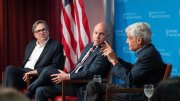The Program on Negotiation (PON), a robust organization headquartered in Pound Hall at Harvard Law School, was founded in 1983 by seven pioneers in what was just then beginning to be recognized as the field of negotiation. Their advice was increasingly sought by individuals, organizations, and governments in conflict, and they wanted a locus and someone to answer the telephone. Today, "as a community of scholars and a renowned teaching center for practitioners, the Program on Negotiation serves a unique role in the world negotiation community," says Susan Hackley, M.P.A. '94, its managing director.
PON is an applied research center dedicated to improving the theory and practice of negotiation and dispute resolution. It is an interuniversity consortium of people from a range of disciplines and professional schools at Harvard, the Massachusetts Institute of Technology, the Fletcher School of Law and Diplomacy at Tufts, Simmons College, and other Boston-area schools.
|
Nine research projects form its intellectual heart. The head of each is a member of the program's steering committee, of which Robert Mnookin is chair. He directs the Harvard Negotiation Research Project (see article). Other projects include:
* The MIT-Harvard Public Disputes Program, directed by Lawrence E. Susskind, Ford professor of urban and environmental planning at MIT and visiting professor of law at Harvard Law School. The program works to replace "win-lose" outcomes with "all-gain" solutions in controversial and complex public-policy wrangles, such as the effort to develop a national energy policy for the United States.
* The Negotiation Roundtable, directed by James K. Sebenius, Ph.D. '80, Donaldson professor of business administration. The roundtable is a group of faculty members, graduate students, and negotiation practitioners who meet regularly at the Business School with colleagues from the Kennedy School of Government and elsewhere to discuss the improvement and practice of negotiation in managerial settings.
* The Dispute Resolution Program, codirected by Frank E.A. Sander '48, LL.B. '52, Bussey professor of law and associate dean of the Law School, and Michael Wheeler (see "You Play the Mall Developer"). The program promotes research on and experimentation with alternative-dispute-resolution mechanisms used as part of the court system. Sander originated the concept of the "multi-door courthouse" — a courthouse that offers a variety of ways to resolve disputes, litigation being only one.
* The Project on the Psychological Processes of Negotiation, directed by Max H. Bazerman, Straus professor of business administration. The project has explored misperceptions in negotiation, escalation of conflict, entrapment, and psychological aspects of culture in negotiation. Bazerman is working on a book about how the psychology of decision making and negotiation account for suboptimal government decisions.
The final four are the Global Negotiation Project, the Harvard Negotiation Project (see "Doctor Yes"), the Program on Negotiations in the Workplace, and the Project on International Institutions and Conflict Management.
In addition to serving as an umbrella for the research projects, PON acts increasingly as an entity of its own, says Mnookin, for instance by sponsoring his "Resettling the Settlers" project. PON mounts negotiation workshops for students at the law school and semester-long seminars open to the public that offer instruction in negotiation and mediation theory and role-playing learning exercises (for example, a multiday case in which students play lawyers for divorcing spouses with children; actors play the parents.). The one-and-a-half to three-day executive-education programs pay the bills. PON produces the Negotiation Journal and books, working papers, and educational and research materials on dispute resolution and sponsors two or three events a week. Visit its website (www.pon.harvard.edu) for details.









